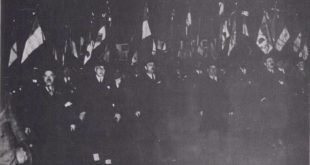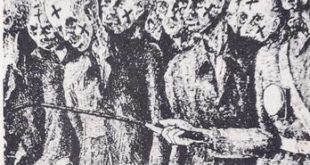All times are, more or less, times of change, but the changes that took place in the 1950’s and 1960’s were extraordinary. This was particularly true in the part of the world dominated by the Soviet Union. During Stalin’s rule, the satellite countries — East Germany, Poland, Czechoslovakia, Rumania, Hungary, Bulgaria and Albania — were like provinces of Russia. The one exception in Eastern Europe was Yugoslavia. In 1948, the Yugoslav government, headed by Josef Tito, refused to follow Stalin’s orders and insisted on maintaining its independence. This was possible for two reasons. There was no Russian army in Yugoslavia, …
Read More »War in Korea 1945-1953
Although the cold war was the most important fact in the politics of the post-war world, few persons could have foreseen that it would lead to fighting in the small, remote country of Korea. Yet, as small and remote as it was, Korea had a strategic location. It was near three large powers — Russia, China and Japan — and the Japanese said it “points like a dagger at the heart of our country.” The Japanese won control of Korea in the Russo-Japanese War and by 1905 they ruled it as part of their empire. During World War II, the …
Read More »A World at War 1939 – 1941
Now the people of Europe began to hear a new sound, a sound that would haunt them throughout the years of war — the wail and shriek of air-raid sirens. At night, the lights of Europe went out and the “blackout” made familiar streets strange places of darkness. Street lamps were left unlit and windows were covered with heavy draperies. Any stray gleam of light might help guide enemy bombers to their targets. Hurrying about their wartime duties, the people of Britain and France began to wonder. They had not wanted war and yet war had come. Why? What had …
Read More »Totalitarianism Versus Democracy
AS THE 1930’s drew to a close, only eight countries in Europe, besides Great Britain and France, were still democracies. They were Belgium, Holland, Switzerland, Czechoslovakia, Norway, Sweden, Denmark and Finland. Three of Europe’s most important nations were dictatorships. The Soviet Union was communist; Germany and Italy were fascist. There had been dictatorships before, but these went further; they were totalitarian. The word “totalitarian” comes from the word “total,” and total control is what these dictatorships were after — total control of their people, total control of their actions and thought. There were differences between the totalitarian countries. While Stalin …
Read More »Democratic but Divided 1926-1939
UNLIKE Britain, France was not a highly industrialized country; its economy was fairly evenly divided between industry and farming. For this reason, the depression came to France later than it did to any of the democracies and its effect was less severe, but in no other democracy did communists and fascists play so large a part. For a time there was real danger that the French republic would be overthrown by the fascists and there were riots in the streets. One reason the fascists were so dangerous was that the French people were sharply divided in their political opinions. There …
Read More »“On the Dole” 1918 – 1936
IN Europe as in America, the leading democratic nations — Great Britain and France — faced the problems of the great depression. In those nations, too, the question arose: Could democracy survive, or would it give way to totalitarianism? Would the people turn instead to fascism or communism? Although Britain had a brief period of prosperity immediately after World War I, of all the world’s democracies, it was struck hardest and soonest by the depression. For Britain had a special problem. A highly industrialized country, it lived by its exports. It sold manufactured goods and coal to other countries and …
Read More »The Meaning of Totalitarianism
So it happened that in many parts of the world people were living under a system of government that came to be called totalitarianism. There were differences in the governments of the totalitarian countries, but they were alike in certain important ways. In each of them, the government was controlled by one political party, usually under a dictator and no other political parties were allowed. The ruling party was not satisfied to control the government; its aim was total control of the life of its people. It controlled the courts and the armed forces, labour and industry, science and the …
Read More »After the Peace of Paris 1919 – 1920
DURING THE war, three great empires — the Russian, the Austro-Hungarian and the German –had vanished forever. Then, by the Treaty of Sévres, a fourth empire, the Ottoman, was quietly put to death. Turkey was confined to Asia Minor and became a republic. Of its former possessions, the League of Nations assigned Syria and Lebanon to France and Palestine and Iraq to Great Britain. Trans-Jordan and Saudi Arabia, which had fought the Turks under an adventurous British colonel named T. E. Lawrence, became independent kingdoms. In Europe, there were seven new states: Finland, Estonia, Latvia, Lithuania, Poland, Czechoslovakia and Yugoslavia. …
Read More »Stalemate in the West, Decision in the East 1914 -1917
Germany’s generals had for some time expected that they would have to fight both France and Russia, and Count Alfred von Schlieffen had devised a battle plan that took this into consideration. The Schlieffen Plan was a good one and it might well have brought the war to an early end — if General Helmut von Moltke, who succeeded Schlieffen as the German commander, had followed it. The plan called for the German army to be divided into an eastern force and a western force. Russia, vast and with few good roads or railroads, would need more time than France …
Read More »The Coming of the Storm 1905 – 1913
ALREADY HEMMED in on two sides by France and Russia, the Germans were dismayed to see Great Britain join their rivals. They feared that they would be surrounded by unfriendly powers and they decided to test the Entente Cordiale. They were anxious to find out how strong it was and how far Great Britain would go in backing up its new ally. The place they chose for the showdown was Morocco, where the French, now with the approval of the British, were policing large areas and taking over territory and rights. So, in March of 1905, a German warship suddenly …
Read More »








